Chuck Berry (1926-2017)
was an American singer, songwriter, and one of the pioneers of rock and roll music. With songs such as “Maybellene” (1955), “Roll Over Beethoven” (1956), “Rock and Roll Music” (1957) and “Johnny B. Goode” (1958), Berry refined and developed rhythm and blues into the major elements that made rock and roll distinctive. Writing lyrics that focused on teen life and consumerism, and developing a music style that included guitar solos and showmanship, Berry was a major influence on subsequent rock music.
Born into a middle-class African-American family in St. Louis, Missouri, Berry had an interest in music from an early age and gave his first public performance at Sumner High School. While still a high school student he was convicted of armed robbery and was sent to a reformatory, where he was held from 1944 to 1947. After his release, Berry settled into married life and worked at an automobile assembly plant. By early 1953, influenced by the guitar riffs and showmanship techniques of the blues musician T-Bone Walker, Berry began performing with the Johnnie Johnson Trio. His break came when he traveled to Chicago in May 1955 and met Muddy Waters, who suggested he contact Leonard Chess, of Chess Records. With Chess, he recorded “Maybellene”—Berry’s adaptation of the country song “Ida Red”—which sold over a million copies, reaching number one on Billboard magazine’s rhythm and blues chart. By the end of the 1950s, Berry was an established star, with several hit records and film appearances and a lucrative touring career. He had also established his own St. Louis nightclub, Berry’s Club Bandstand. However, he was sentenced to three years in prison in January 1962 for offenses under the Mann Act—he had transported a 14-year-old girl across state lines. After his release in 1963, Berry had several more hits, including “No Particular Place to Go”, “You Never Can Tell”, and “Nadine”. But these did not achieve the same success, or lasting impact, of his 1950s songs, and by the 1970s he was more in demand as a nostalgic performer, playing his past hits with local backup bands of variable quality. However, in 1972 he reached a new level of achievement when a rendition of “My Ding-a-Ling” became his only record to top the charts. His insistence on being paid in cash led in 1979 to a four-month jail sentence and community service, for tax evasion.
Berry was among the first musicians to be inducted into the Rock and Roll Hall of Fame on its opening in 1986;
The Beatles
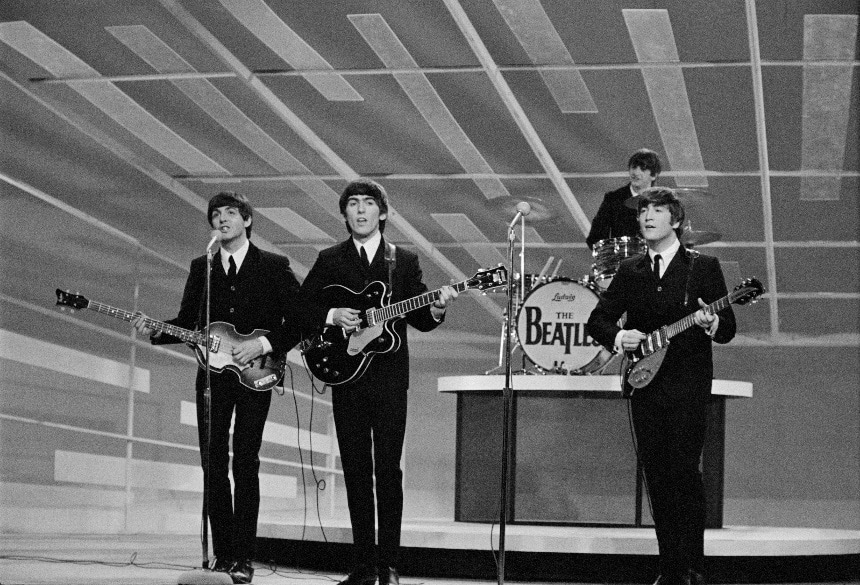
were an English rock band formed in Liverpool in 1960. With members John Lennon, Paul McCartney, George Harrison and Ringo Starr, they became widely regarded as the foremost and most influential music band in history. Rooted in skiffle, beat and 1950s rock and roll, the Beatles later experimented with several musical styles, ranging from pop ballads and Indian music to psychedelia and hard rock, often incorporating classical elements and unconventional recording techniques in innovative ways. In 1963, their enormous popularity first emerged as “Beatlemania”; as the group’s music grew in sophistication, led by primary songwriters Lennon and McCartney, the band were integral to pop music’s evolution into an art form and to the development of the counterculture of the 1960s.
The Beatles built their reputation playing clubs in Liverpool and Hamburg over a three-year period from 1960, with Stuart Sutcliffe initially serving as bass player. The core trio of Lennon, McCartney and Harrison, together since 1958, went through a succession of drummers, including Pete Best, before asking Starr to join them in 1962. Manager Brian Epstein moulded them into a professional act, and producer George Martin guided and developed their recordings, greatly expanding the group’s popularity in the United Kingdom after their first hit, “Love Me Do”, in late 1962. They acquired the nickname “the Fab Four” as Beatlemania grew in Britain over the next year, and by early 1964 became international stars, leading the “British Invasion” of the United States pop market. From 1965 onwards, the Beatles produced increasingly innovative recordings, including the albums Rubber Soul (1965), Revolver (1966), Sgt. Pepper’s Lonely Hearts Club Band (1967), The Beatles (also known as the “White Album”, 1968) and Abbey Road (1969). After their break-up in 1970, they each enjoyed success as solo artists. Lennon was shot and killed in December 1980, and Harrison died of lung cancer in November 2001. McCartney and Starr remain musically active.
The Beatles are the best-selling band in history, with estimated sales of over 800 million physical and digital albums worldwide. They have had more number-one albums on the British charts and sold more singles in the UK than any other act. They are also the best-selling music artists in the United States, with 178 million certified units.
BB King (1925-2015)
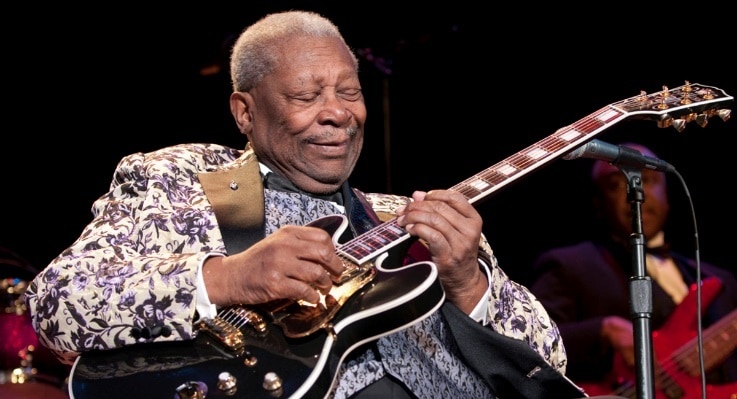
Was an American blues singer, electric guitarist, songwriter, and record producer. King introduced a sophisticated style of soloing based on fluid string bending and shimmering vibrato that influenced many later electric blues guitarists.
King was inducted into the Rock and Roll Hall of Fame in 1987, and is considered one of the most influential blues musicians of all time, earning the nickname “The King of the Blues”, and is considered one of the “Three Kings of the Blues Guitar” (along with Albert and Freddie King). King was known for performing tirelessly throughout his musical career, appearing on average at more than 200 concerts per year into his 70s. In 1956 alone, he reportedly appeared at 342 shows.
King was born on a cotton plantation in Berclair, Mississippi, and later worked at a cotton gin in Indianola, Mississippi. He was attracted to music and the guitar in church, and began his career in juke joints and local radio. He later lived in Memphis, Tennessee, and Chicago, and toured the world extensively. King died at the age of 89 in Las Vegas, Nevada, on May 14, 2015.
The Band
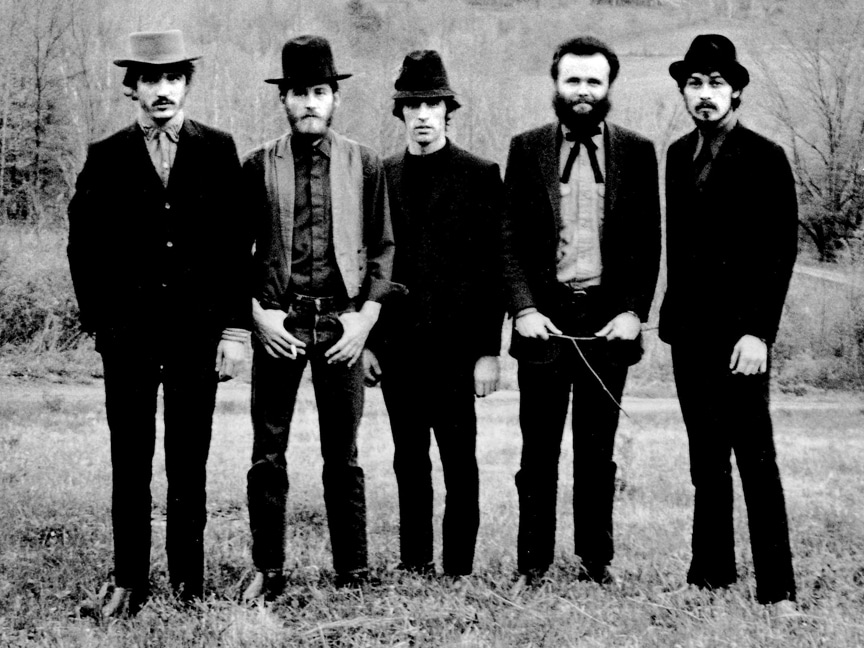
was a Canadian-American roots rock group including Rick Danko (bass guitar, vocals), Garth Hudson (keyboards, saxophone), Richard Manuel (keyboards, vocals), Robbie Robertson (guitar, vocals), and Levon Helm (drums, vocals). The members of the Band first came together as rockabilly singer Ronnie Hawkins’s Toronto, Ontario-based backing group, the Hawks, which they joined one by one between 1958 and 1963.
In 1964, they separated from Hawkins, after which they toured and released a few singles as Levon and the Hawks and the Canadian Squires. The next year, Bob Dylan hired them for his U.S. tour in 1965 and world tour in 1966. Following the 1966 tour, the group moved with help from Bob Dylan and his manager, Albert Grossman, to Saugerties, New York, where they made the informal 1967 recordings that became The Basement Tapes, the basis for their 1968 debut album, Music from Big Pink. Because they were always “the band” to various frontmen and the locals in Woodstock, Helm said the name “the Band” worked well when the group came into its own. The group began performing as the Band in 1968 and went on to release ten studio albums. Dylan continued to collaborate with the Band over the course of their career, including a joint 1974 tour.
The original configuration of the Band ended its touring career in 1976 with an elaborate performance at Winterland Ballroom in San Francisco, California that featured numerous musical celebrities of the era. This performance was filmed for Martin Scorsese’s 1978 documentary The Last Waltz. Although the members of the group intended to continue working on studio projects, they drifted apart after the release of Islands in March 1977.
The Band resumed touring in 1983 without Robertson, who had found success with a solo career and as a Hollywood music producer. As a result of their diminished popularity, they performed in theaters and clubs as headliners and took support slots in larger venues for onetime peers such as the Grateful Dead and Crosby, Stills and Nash. Following a 1986 concert, Manuel committed suicide in his hotel room. The remaining three members continued to tour and record albums with a succession of musicians filling Manuel’s and Robertson’s roles; the final configuration of the group included Richard Bell (piano), Randy Ciarlante (drums), and Jim Weider (guitar). Danko died of heart failure in 1999, after which the group broke up for good. Helm was diagnosed with throat cancer in 1998 and was unable to sing for several years, but he eventually regained the use of his voice. He continued to perform and released several successful albums until he died in 2012.
Creedence Clearwater Revival
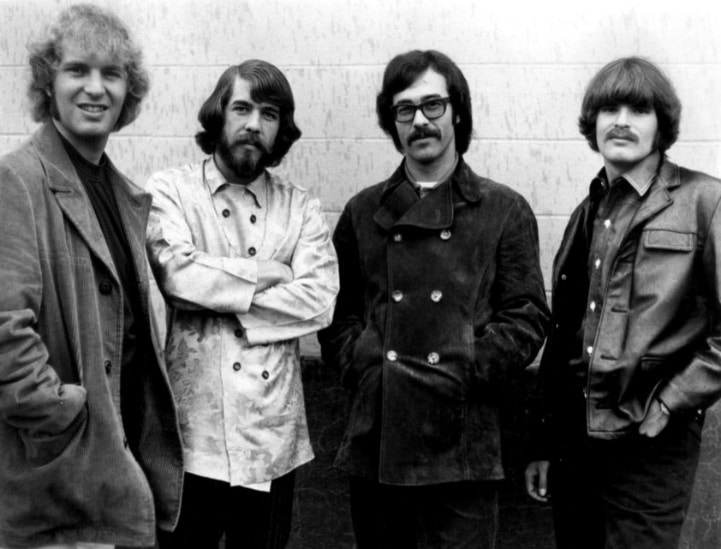
was an American rock band active in the late 1960s and early 1970s which consisted of lead vocalist, lead guitarist, and primary songwriter John Fogerty, his brother rhythm guitarist Tom Fogerty, bassist Stu Cook, and drummer Doug Clifford. These members had played together since 1959, first as The Blue Velvets, then as The Golliwogs. Their musical style encompassed roots rock, swamp rock, and blues rock. They played in a Southern rock style, despite their San Francisco Bay Area origin, with lyrics about bayous, catfish, the Mississippi River, and other popular elements of Southern United States iconography, as well as political and socially conscious lyrics about topics including the Vietnam War. The band performed at the 1969 Woodstock Festival in Upstate New York.
The group disbanded acrimoniously in late 1972 after four years of chart-topping success. Tom Fogerty had officially left the previous year, and John was at odds with the remaining members over matters of business and artistic control, all of which resulted in subsequent lawsuits among the former bandmates. Fogerty’s ongoing disagreements with Fantasy Records owner Saul Zaentz created further protracted court battles, and John Fogerty refused to perform with the two other surviving members at CCR’s 1993 induction into the Rock and Roll Hall of Fame.
Creedence Clearwater Revival’s music is still a staple of US radio airplay; the band has sold 26 million albums in the United States alone.
The Allman Brothers Band
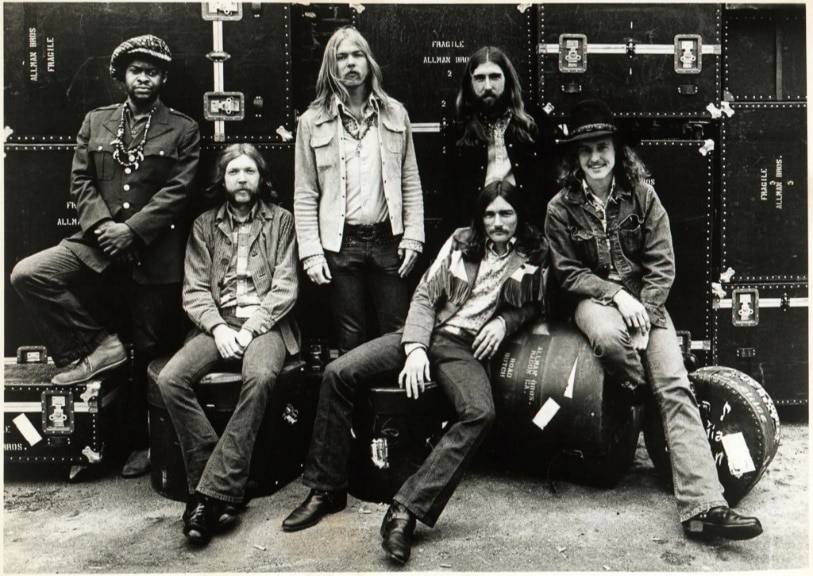
was an American rock band formed in Jacksonville, Florida, United States, in 1969 by brothers Duane Allman (slide guitar and lead guitar) and Gregg Allman (vocals, keyboards, songwriting), as well as Dickey Betts (lead guitar, vocals, songwriting), Berry Oakley (bass guitar), Butch Trucks (drums), and Jai Johanny “Jaimoe” Johanson (drums). The band incorporated elements of Southern rock, blues, jazz, and country music, and their live shows featured jam band-style improvisation and instrumentals.
The group’s first two studio releases stalled commercially, but their 1971 live release, At Fillmore East, represented an artistic and commercial breakthrough. The album features extended renderings of their songs “In Memory of Elizabeth Reed” and “Whipping Post”, and is often considered among the best live albums ever made. Group leader Duane Allman was killed in a motorcycle accident later that year, and the band dedicated Eat a Peach (1972) in his memory, a dual studio/live album that cemented the band’s popularity. Following the motorcycle death of bassist Berry Oakley later that year, the group recruited keyboardist Chuck Leavell and bassist Lamar Williams for 1973’s Brothers and Sisters, which, combined with the hit single “Ramblin’ Man”, placed the group at the forefront of 1970s rock music. Internal turmoil overtook them soon after; the group dissolved in 1976, reformed briefly at the end of the decade with additional personnel changes, and dissolved again in 1982.
The band reformed once more in 1989, releasing a string of new albums and touring heavily. A series of personnel changes in the late 1990s was capped by the departure of Betts. The group found stability during the 2000s with bassist Oteil Burbridge and guitarists Warren Haynes and Derek Trucks (the nephew of their original drummer) and became renowned for their month-long string of shows at New York City’s Beacon Theatre each spring. The band retired for good in 2014 with the departure of Haynes and Derek Trucks. Butch Trucks died of a self-inflicted gunshot wound to the head on January 24, 2017, in West Palm Beach, Florida, at the age of 69. Gregg Allman died from complications arising from liver cancer in May 2017. The band has been awarded seven gold and four platinum albums, and was inducted into the Rock and Roll Hall of Fame in 1995.
Led Zeppelin
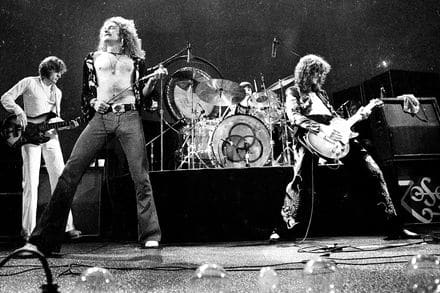 An English rock band formed in London in 1968. The group consisted of guitarist Jimmy Page, singer Robert Plant, bassist and keyboardist John Paul Jones, and drummer John Bonham. The band’s heavy, guitar-driven sound has led them to be cited as one of the progenitors of heavy metal. Their style drew from a wide variety of influences, including blues, psychedelia, and folk music.
An English rock band formed in London in 1968. The group consisted of guitarist Jimmy Page, singer Robert Plant, bassist and keyboardist John Paul Jones, and drummer John Bonham. The band’s heavy, guitar-driven sound has led them to be cited as one of the progenitors of heavy metal. Their style drew from a wide variety of influences, including blues, psychedelia, and folk music.
After changing their name from the New Yardbirds, Led Zeppelin signed a deal with Atlantic Records that afforded them considerable artistic freedom. Although the group were initially unpopular with critics, they achieved significant commercial success with albums such as Led Zeppelin (1969), Led Zeppelin II (1969), Led Zeppelin III (1970), Led Zeppelin IV (1971), Houses of the Holy (1973), Physical Graffiti (1975), Presence (1976) and In Through the Out Door (1979). Their fourth album, which features the song “Stairway to Heaven”, is among the most popular and influential works in rock music, and it helped to secure the group’s popularity.
Page wrote most of Led Zeppelin’s music, particularly early in their career, while Plant generally supplied the lyrics. Jones’ keyboard-based compositions later became central to the group’s catalogue, which featured increasing experimentation. The latter half of their career saw a series of record-breaking tours that earned the group a reputation for excess and debauchery. Although they remained commercially and critically successful, their output and touring schedule were limited during the late 1970s, and the group disbanded following Bonham’s death from alcohol-related asphyxia in 1980. In the decades that followed, the surviving members sporadically collaborated and participated in one-off Led Zeppelin reunions.
Traveling Wilbury
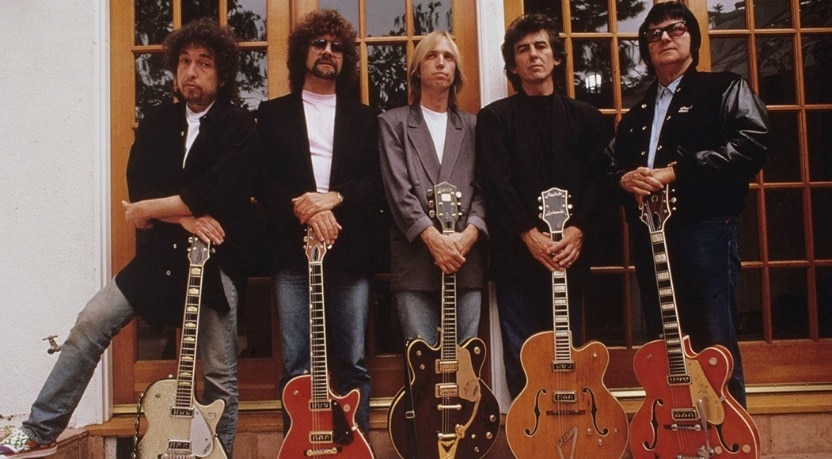
were a British-American supergroup consisting of Bob Dylan, George Harrison, Jeff Lynne, Roy Orbison, and Tom Petty. The band recorded two albums, the first in 1988 and the second in 1990, though Orbison died before the second was recorded.
The project’s work received much anticipation given the diverse nature of the singer-songwriters. Their debut album Traveling Wilburys Vol. 1 proved an enduring critical success, in 1989 and 1990 winning accolades such as a Grammy for Best Rock Performance by a Duo or Group.
Roy Orbison (1936-1988)
 An American singer, songwriter, and musician known for his powerful voice, wide vocal range, impassioned singing style, complex song structures, and dark, emotional ballads. The combination led many critics to describe his music as operatic, nicknaming him “the Caruso of Rock” and “the Big O”. While most male rock-and-roll performers in the 1950s and 1960s projected a defiant masculinity, many of Orbison’s songs instead conveyed vulnerability. His voice ranged from baritone to tenor, and music scholars have suggested that he had a three- or four-octave range. During performances, he was known for standing still and solitary, and for wearing black clothes, to match his dyed jet-black hair and dark sunglasses, which lent an air of mystery to his persona.
An American singer, songwriter, and musician known for his powerful voice, wide vocal range, impassioned singing style, complex song structures, and dark, emotional ballads. The combination led many critics to describe his music as operatic, nicknaming him “the Caruso of Rock” and “the Big O”. While most male rock-and-roll performers in the 1950s and 1960s projected a defiant masculinity, many of Orbison’s songs instead conveyed vulnerability. His voice ranged from baritone to tenor, and music scholars have suggested that he had a three- or four-octave range. During performances, he was known for standing still and solitary, and for wearing black clothes, to match his dyed jet-black hair and dark sunglasses, which lent an air of mystery to his persona.
Born in Texas, Orbison began singing in a rockabilly and country-and-western band in high school. He was signed by Sam Phillips, of Sun Records, in 1956, but his greatest success came with Monument Records. From 1960 to 1966, 22 of his singles reached the Billboard Top 40, and he wrote or co-wrote almost all that rose to the Top 10, including “Only the Lonely” (1960), “Running Scared” (1961), “Crying” (1961), “In Dreams” (1963), and “Oh, Pretty Woman” (1964). Soon afterward, Orbison was struck by several personal tragedies while his record sales declined. In the 1980s, he experienced a resurgence in popularity through the success of several cover versions of his songs, and in 1988, co-founded the Traveling Wilburys, a rock supergroup with George Harrison, Bob Dylan, Tom Petty, and Jeff Lynne. He died of a heart attack later that year, at the age of 52. One month later, his song “You Got It” (1989), co-written with Lynne and Petty, was released as a solo single and became his first to break the U.S. Top 10 in 25 years.
His honors include inductions into the Rock and Roll Hall of Fame in 1987, the Nashville Songwriters Hall of Fame in the same year, and the Songwriters Hall of Fame in 1989.
The Eagles
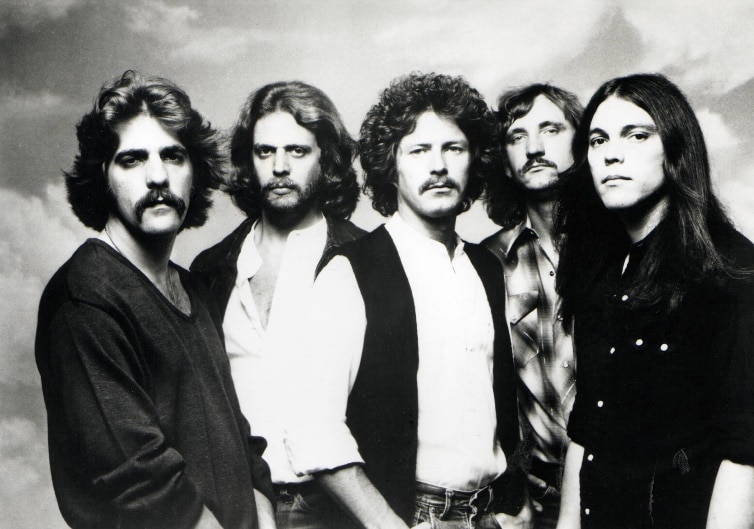
are an American rock band formed in Los Angeles in 1971. The founding members were Glenn Frey (guitars, vocals), Don Henley (drums, vocals), Bernie Leadon (guitars, vocals) and Randy Meisner (bass guitar, vocals). With five number-one singles, six Grammy Awards, five American Music Awards, and six number-one albums, the Eagles were one of the most successful musical acts of the 1970s. At the end of the 20th century, two of their albums, Their Greatest Hits (1971–1975) and Hotel California, were ranked among the 20 best-selling albums in the United States according to the Recording Industry Association of America. By 2006, both albums were among the top three best-selling albums in the United States. Hotel California is ranked 37th in Rolling Stone‘s list of “The 500 Greatest Albums of All Time” and the band was ranked number 75 on the magazine’s 2004 list of the 100 Greatest Artists of All Time.
The Eagles are one of the world’s best-selling bands in history, having sold more than 150 million records—100 million in the U.S. alone. Their Greatest Hits (1971–1975) is the number one selling album in the US with more than 38 million sales streams and Hotel California is the third best selling album with more than 26 million sales and streams. Their Greatest Hits (1971–1975) was the best selling album of the 20th century in the U.S. They are the fifth-highest-selling music act and the highest-selling American band in U.S. history.
The band released their debut album, Eagles, in 1972, which spawned three top 40 singles: “Take It Easy”, “Witchy Woman”, and “Peaceful Easy Feeling”. Their next album, Desperado (1973), was less successful than the first, only reaching number 41 on the charts; neither of its singles reached the top 40. However, the album does contain what would go on to be two of the band’s most popular tracks: “Desperado” and “Tequila Sunrise”. The band released On the Border in 1974, adding guitarist Don Felder as the fifth member midway through the recording of the album. The album generated two top 40 singles: “Already Gone” and their first number one, “Best of My Love”.
Their 1975 album One of These Nights included three top 10 singles: “One of These Nights”, “Lyin’ Eyes”, and “Take It to the Limit”, the first hitting the top of the charts. Guitarist and vocalist Joe Walsh also joined the band in 1975 replacing Leadon. The Eagles continued that success and hit their commercial peak in late 1976 with the release of Hotel California, which would go on to sell more than 16 million copies in the U.S. alone and more than 32 million copies worldwide. The album yielded two number-one singles, “New Kid in Town” and “Hotel California”. Meisner left the band in 1977 and was replaced by Timothy B. Schmit. They released their last studio album for nearly 28 years in 1979 with The Long Run, which spawned three top 10 singles: “Heartache Tonight”, “The Long Run”, and “I Can’t Tell You Why”, the lead single being another chart-topping hit.
The Eagles disbanded in July 1980 but reunited in 1994 for the album Hell Freezes Over, a mix of live and new studio tracks. They toured consistently and were inducted into the Rock and Roll Hall of Fame in 1998. In 2007, the Eagles released Long Road Out of Eden, their first full studio album in 28 years and their sixth number-one album. The next year they launched the Long Road Out of Eden Tour in support of the album. In 2013, they began the extended History of the Eagles Tour in conjunction with the band’s documentary release, History of the Eagles.
Following the death of Frey in January 2016, Henley stated in several interviews that he did not think the band would perform again. However, the Eagles continued performing in 2017 with guest musicians Deacon Frey (son of Glenn) and Vince Gill.
Lynyrd Skynyrd
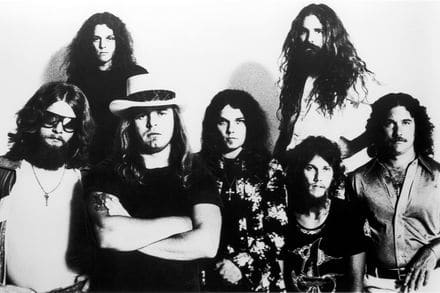 An American rock band best known for popularizing the Southern rock genre during the 1970s. With roots tracing to the formation of My Backyard in Jacksonville, Florida in 1964, the band was also known by names such as The Noble Five and One Percent, before finally deciding on “Lynyrd Skynyrd” in 1969. The band gained worldwide recognition for its live performances and signature songs “Sweet Home Alabama” and “Free Bird”. At the peak of their success, band members Ronnie Van Zant and Steve Gaines, and backup singer Cassie Gaines, died in an airplane crash in 1977, putting an abrupt end to the 1970s era of the band.
An American rock band best known for popularizing the Southern rock genre during the 1970s. With roots tracing to the formation of My Backyard in Jacksonville, Florida in 1964, the band was also known by names such as The Noble Five and One Percent, before finally deciding on “Lynyrd Skynyrd” in 1969. The band gained worldwide recognition for its live performances and signature songs “Sweet Home Alabama” and “Free Bird”. At the peak of their success, band members Ronnie Van Zant and Steve Gaines, and backup singer Cassie Gaines, died in an airplane crash in 1977, putting an abrupt end to the 1970s era of the band.
The surviving band members re-formed in 1987 for a reunion tour with lead vocalist Johnny Van Zant, the younger brother of Ronnie Van Zant. Lynyrd Skynyrd continues to tour and record with co-founder Gary Rossington, Johnny Van Zant, and Rickey Medlocke, who first wrote and recorded with the band from 1971 to 1972 before his return in 1996. Artimus Pyle remains active in music, but no longer tours or records with the band. Michael Cartellone has recorded and toured with the band since 1999.
Lynyrd Skynyrd has sold 28 million records in the United States. They were inducted into the Rock and Roll Hall of Fame on March 13, 2006.
ZZ Top
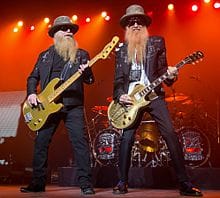 An American rock band formed in 1969 in Houston, Texas. The band has, since 1970, consisted of bassist and vocalist Dusty Hill, guitarist and lead vocalist Billy Gibbons (the band’s leader, main lyricist and musical arranger), and drummer Frank Beard.
An American rock band formed in 1969 in Houston, Texas. The band has, since 1970, consisted of bassist and vocalist Dusty Hill, guitarist and lead vocalist Billy Gibbons (the band’s leader, main lyricist and musical arranger), and drummer Frank Beard.
The band released its first album—called ZZ Top’s First Album—in 1971. Beginning with blues-inspired rock, the band incorporated new wave, punk rock and dance-rock by using synthesizers. The band is also known for its humorous lyrics laced with double entendres and innuendo.
The band’s top-selling album is their 1983 release Eliminator, which sold more than 10 million copies in the United States. Total record sales of 25 million place ZZ Top among the top-100-selling artists in the United States, according to the Recording Industry Association of America. That includes 11 gold, seven platinum and three multi-platinum records as of 2016, according to the RIAA. By 2014, ZZ Top had sold more than 50 million albums worldwide.
ZZ Top was inducted into the Rock and Roll Hall of Fame in 2004.
Tom Petty and the Heartbreakers
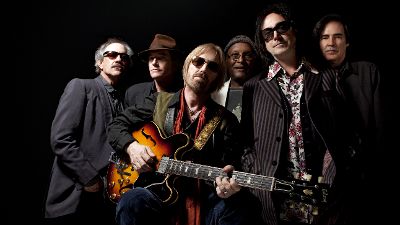 An American rock band from Gainesville, Florida. Formed in 1976, the band originally comprised Tom Petty (lead singer, guitar), Mike Campbell (lead guitarist), Ron Blair (bass guitar), Stan Lynch (drums), and Benmont Tench (keyboards). The band largely maintained this lineup, with a few exceptions. In 1981, Blair, weary of the touring lifestyle, departed the band. His replacement, Howie Epstein, stayed with the band for the next two decades. In 1991, Scott Thurston joined the band as a multi-instrumentalist—mostly on rhythm guitar and second keyboards. Blair returned to the Heartbreakers in 2002, the year before Epstein’s death. In 1994, Steve Ferrone replaced Lynch on drums. The band is best known for the hit singles “American Girl”, “Breakdown”, “The Waiting”, “Learning to Fly”, “Refugee” and “Mary Jane’s Last Dance”.
An American rock band from Gainesville, Florida. Formed in 1976, the band originally comprised Tom Petty (lead singer, guitar), Mike Campbell (lead guitarist), Ron Blair (bass guitar), Stan Lynch (drums), and Benmont Tench (keyboards). The band largely maintained this lineup, with a few exceptions. In 1981, Blair, weary of the touring lifestyle, departed the band. His replacement, Howie Epstein, stayed with the band for the next two decades. In 1991, Scott Thurston joined the band as a multi-instrumentalist—mostly on rhythm guitar and second keyboards. Blair returned to the Heartbreakers in 2002, the year before Epstein’s death. In 1994, Steve Ferrone replaced Lynch on drums. The band is best known for the hit singles “American Girl”, “Breakdown”, “The Waiting”, “Learning to Fly”, “Refugee” and “Mary Jane’s Last Dance”.
The band was part of Southern rock, but also at the forefront of the heartland rock movement, alongside artists such as Bruce Springsteen, Bob Seger, and John Mellencamp who arose in the late 1970s and 1980s. The genre eschews the synthesizer-based music and fashion elements popular in synthpop and New Romanticism in favor of a straightforward classic rock sound, and lyrics based on relatable, blue collar issues. While the heartland rock movement waned in the 1990s, the band remained active and popular, touring regularly until Petty’s death in 2017, after which the Heartbreakers disbanded. Their final studio album, Hypnotic Eye, was released in 2014.
Although most of their material was produced and performed under the name “The Heartbreakers”, Petty released three solo albums, the most successful of which was Full Moon Fever (1989). In these releases, members of the band contributed as collaborators, producing and performing as studio musicians.
The Rolling Stones
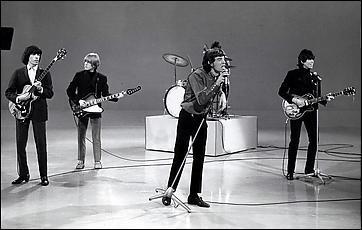 An English rock band formed in London, England, in 1962. The first stable line-up consisted of Brian Jones (guitar, harmonica), Mick Jagger (lead vocals), Keith Richards (guitar, backing vocals), Bill Wyman (bass), Charlie Watts (drums), and Ian Stewart (piano). Stewart was removed from the official line-up in 1963 but continued as a touring member until his death in 1985. Brian Jones was the original leader of the group. The band’s primary songwriters, Jagger and Richards, assumed leadership after Andrew Loog Oldham became the group’s manager. Their musical focus shifted from covering blues songs to writing original material, a decision with which Jones did not agree. Jones left the band less than a month before his death in 1969, having already been replaced by Mick Taylor, who remained until 1974. After Taylor left the band, Ronnie Wood took his place in 1975 and continues on guitar in tandem with Richards. Following Wyman’s departure in 1993, Darryl Jones joined as their touring bassist. The Stones’ touring keyboardists have included Nicky Hopkins (1967–1982), Ian McLagan (1978–1981), Billy Preston (through the mid-1970s) and Chuck Leavell (1982–present).
An English rock band formed in London, England, in 1962. The first stable line-up consisted of Brian Jones (guitar, harmonica), Mick Jagger (lead vocals), Keith Richards (guitar, backing vocals), Bill Wyman (bass), Charlie Watts (drums), and Ian Stewart (piano). Stewart was removed from the official line-up in 1963 but continued as a touring member until his death in 1985. Brian Jones was the original leader of the group. The band’s primary songwriters, Jagger and Richards, assumed leadership after Andrew Loog Oldham became the group’s manager. Their musical focus shifted from covering blues songs to writing original material, a decision with which Jones did not agree. Jones left the band less than a month before his death in 1969, having already been replaced by Mick Taylor, who remained until 1974. After Taylor left the band, Ronnie Wood took his place in 1975 and continues on guitar in tandem with Richards. Following Wyman’s departure in 1993, Darryl Jones joined as their touring bassist. The Stones’ touring keyboardists have included Nicky Hopkins (1967–1982), Ian McLagan (1978–1981), Billy Preston (through the mid-1970s) and Chuck Leavell (1982–present).
The Rolling Stones were at the forefront of the British Invasion of bands that became popular in the United States in 1964 and were identified with the youthful and rebellious counterculture of the 1960s. Rooted in blues and early rock and roll, the group began a short period of musical experimentation in the mid-1960s that peaked with the psychedelic album Their Satanic Majesties Request (1967). Subsequently, the group returned to its “bluesy” roots with Beggars Banquet (1968) which along with its follow-ups Let It Bleed (1969), Sticky Fingers (1971) and Exile on Main St. (1972) is generally considered the band’s best work and is seen as their “Golden Age”. During this period, they were first introduced on stage as “The Greatest Rock and Roll Band in the World”. Musicologist Robert Palmer attributed the endurance of the Rolling Stones to their being “rooted in traditional verities, in rhythm-and-blues and soul music”, while “more ephemeral pop fashions have come and gone”.
The band continued releasing commercially successful albums, including Some Girls (1978) and Tattoo You (1981), which were their most popular albums worldwide. From 1983 to 1987 tensions between Jagger and Richards almost caused the band to split; however, they overcame their differences and rekindled their friendship after a temporary separation to work on solo projects. The Stones experienced a comeback with Steel Wheels (1989), promoted by a large stadium and arena tour. Since the 1990s, new recorded material from the group has been less frequent and less well-received. Despite this, the Rolling Stones continued to be a huge attraction on the live circuit, with stadium tours in the 1990s and 2000s. By 2007, the band had four of the top five highest-grossing concert tours of all time: Voodoo Lounge Tour (1994–1995), Bridges to Babylon Tour (1997–1998), Licks Tour (2002–2003) and A Bigger Bang Tour (2005–2007).
The Rolling Stones were inducted into the Rock and Roll Hall of Fame in 1989 and the UK Music Hall of Fame in 2004.
